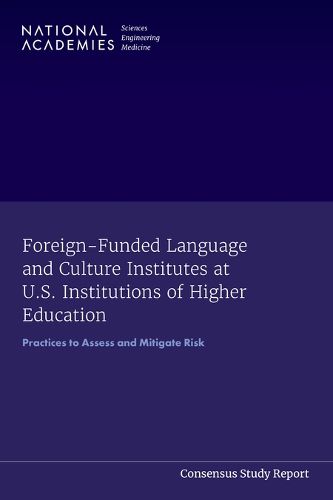Readings Newsletter
Become a Readings Member to make your shopping experience even easier.
Sign in or sign up for free!
You’re not far away from qualifying for FREE standard shipping within Australia
You’ve qualified for FREE standard shipping within Australia
The cart is loading…






Foreign-funded language and culture institutes exist on U.S. campuses beyond Confucius Institutes (CIs)-Chinese government-funded centers established by the Chinese Communist Party to extend the reach of Chinese language and culture and to enhance worldwide opinion of China through offering classes in Mandarin Chinese and highlighting positive aspects of Chinese culture. Regardless of the sponsoring nation, foreign-funded language and culture institutes may pose risks for U.S. host institutions regarding academic freedom, freedom of expression, governance, and national security. This is particularly true if the values of the sponsoring nation do not align with the democratic values held in the United States and if the sponsoring nation is suspected of engaging in activities adversely affecting human rights, academic freedom, freedom of expression, association, dissent, and U.S. national security.
This report explores the role of other foreign-funded institutes at U.S. institutions of higher education, describing characteristics and features of such institutes; determining characteristics and features of foreign-funded institutes at U.S. institutions of higher education that could be flags for institutions to engage in further deliberation and vetting prior to entering into a partnership; identifying implementable practices for U.S. institutions of higher education to ensure appropriate operations; and continuing exploration of what role the sensitivity of the research conducted on campus should play in determining which foreign-funded partnerships are appropriate. Foreign-Funded Language and Culture Institutes at U.S. Institutions of Higher Education recommends actions that U.S. colleges and universities can take to minimize risks associated with hosting foreign-funded language and culture institutions, such as a CI, on or near campus and protect academic freedom and national security.
Table of Contents
Front Matter Summary 1 Introduction 2 Characteristics and Features of Foreign-Funded Language and Culture Institutes 3 Benefits and Risks of Foreign-Funded Language and Culture Institutes 4 Implementable Practices for Assessing and Managing Risk to Ensure Appropriate Operations at U.S. Institutions of Higher Education 5 Findings 6 Recommendations References Appendix A: Committee Biographical Information Appendix B: Summary of First Report Appendix C: Regulatory and Compliance Issues Appendix D: Assessing Risk Appendix E: Foreign-Funded Language and Culture Institutes (FFL&CI) Appendix F: International Engagement Strategy Documents Developed by U.S. Institutions of Higher Education
$9.00 standard shipping within Australia
FREE standard shipping within Australia for orders over $100.00
Express & International shipping calculated at checkout
Foreign-funded language and culture institutes exist on U.S. campuses beyond Confucius Institutes (CIs)-Chinese government-funded centers established by the Chinese Communist Party to extend the reach of Chinese language and culture and to enhance worldwide opinion of China through offering classes in Mandarin Chinese and highlighting positive aspects of Chinese culture. Regardless of the sponsoring nation, foreign-funded language and culture institutes may pose risks for U.S. host institutions regarding academic freedom, freedom of expression, governance, and national security. This is particularly true if the values of the sponsoring nation do not align with the democratic values held in the United States and if the sponsoring nation is suspected of engaging in activities adversely affecting human rights, academic freedom, freedom of expression, association, dissent, and U.S. national security.
This report explores the role of other foreign-funded institutes at U.S. institutions of higher education, describing characteristics and features of such institutes; determining characteristics and features of foreign-funded institutes at U.S. institutions of higher education that could be flags for institutions to engage in further deliberation and vetting prior to entering into a partnership; identifying implementable practices for U.S. institutions of higher education to ensure appropriate operations; and continuing exploration of what role the sensitivity of the research conducted on campus should play in determining which foreign-funded partnerships are appropriate. Foreign-Funded Language and Culture Institutes at U.S. Institutions of Higher Education recommends actions that U.S. colleges and universities can take to minimize risks associated with hosting foreign-funded language and culture institutions, such as a CI, on or near campus and protect academic freedom and national security.
Table of Contents
Front Matter Summary 1 Introduction 2 Characteristics and Features of Foreign-Funded Language and Culture Institutes 3 Benefits and Risks of Foreign-Funded Language and Culture Institutes 4 Implementable Practices for Assessing and Managing Risk to Ensure Appropriate Operations at U.S. Institutions of Higher Education 5 Findings 6 Recommendations References Appendix A: Committee Biographical Information Appendix B: Summary of First Report Appendix C: Regulatory and Compliance Issues Appendix D: Assessing Risk Appendix E: Foreign-Funded Language and Culture Institutes (FFL&CI) Appendix F: International Engagement Strategy Documents Developed by U.S. Institutions of Higher Education